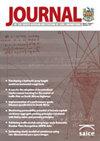评估公共卫生基础设施组合状况的实用衍生方法
IF 0.6
4区 工程技术
Q4 ENGINEERING, CIVIL
Journal of the South African Institution of Civil Engineering
Pub Date : 2022-09-14
DOI:10.17159/2309-8775/2022/v64n3a5
引用次数: 2
摘要
关于南非已建成环境固定基础设施状况的2006年、2011年和2017年报告卡是科学与工业研究委员会(CSIR)和南非土木工程研究所(SAICE)合作的产物。其目的是提请政府和广大公众注意维护的重要性,以及公共部门基础设施状况的基本因素。在所有三份报告卡中评估的十个公共基础设施部门之一是卫生部门,包括医院和诊所。本文描述了如何对2017年卫生部门状况数据的基础设施报告卡进行收集和分析。特别是,它描述了在缺乏一个全面、合理的最新数据库的情况下,以及在没有考虑到对其进行询问和整合的情况下汇编可用数据集的方式,CSIR如何制定了一种实用的衍生方法来评估公共卫生基础设施投资组合的状况。本文章由计算机程序翻译,如有差异,请以英文原文为准。
A pragmatic derivative method to assess the condition of a public health built infrastructure portfolio
The 2006, 2011 and 2017 Report Cards on the condition of built environment fixed infrastructure in South Africa were the product of cooperation between the Council for Scientific and Industrial Research (CSIR) and the South African Institution of Civil Engineering (SAICE). Their purpose has been to draw the attention of government, and of the public at large, to the importance of maintenance, and to factors underlying the condition of public sector infrastructure. One of the ten public infrastructure sectors assessed in all three report cards was the health sector, comprising hospitals and clinics. This paper describes how the collection and analysis for the 2017 infrastructure report card of health sector condition data was conducted. In particular, it describes how, in the absence of a comprehensive reasonably up-to-date database, and the way, without their interrogation and integration in mind, in which available datasets had been compiled, the CSIR formulated a pragmatic derivative method to assess the condition of the public health built infrastructure portfolio.
求助全文
通过发布文献求助,成功后即可免费获取论文全文。
去求助
来源期刊
CiteScore
0.70
自引率
25.00%
发文量
19
审稿时长
>12 weeks
期刊介绍:
The Journal of the South African Institution of Civil Engineering publishes peer reviewed papers on all aspects of Civil Engineering relevant to Africa. It is an open access, ISI accredited journal, providing authoritative information not only on current developments, but also – through its back issues – giving access to data on established practices and the construction of existing infrastructure. It is published quarterly and is controlled by a Journal Editorial Panel.
The forerunner of the South African Institution of Civil Engineering was established in 1903 as a learned society aiming to develop technology and to share knowledge for the development of the day. The minutes of the proceedings of the then Cape Society of Civil Engineers mainly contained technical papers presented at the Society''s meetings. Since then, and throughout its long history, during which time it has undergone several name changes, the organisation has continued to publish technical papers in its monthly publication (magazine), until 1993 when it created a separate journal for the publication of technical papers.

 求助内容:
求助内容: 应助结果提醒方式:
应助结果提醒方式:


